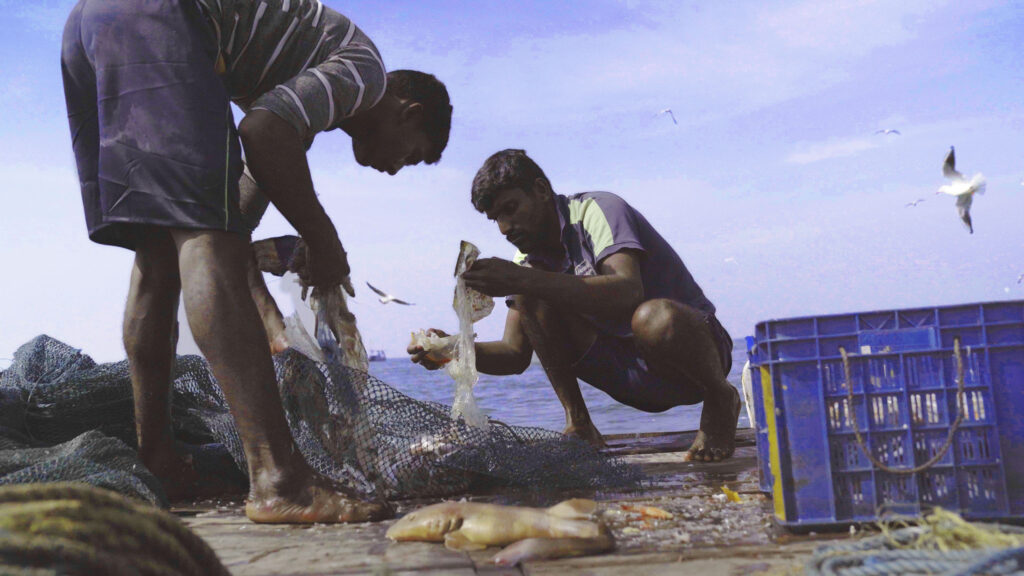Sarvnik Kaur’s 97-minute-long documentary, Against the Tide (2023), focuses on two individuals, Rakesh Koli and Ganesh Ganesh Nakhawa, both from the Koli community of Mumbai, who depend on fishing for their survival. By relying on a powerful sea that is burgeoning belligerently due to climate change, each of them confronts crises that affect both – their professional and personal lives. By observing the highs and lows in the lives of two people, the documentary deftly focuses on the nuances rather than follow an obviously polemical method to illustrate the problems faced by the Kolis.
Rakesh lives in a Koli village on the outskirts of the maximum city with his mother, Bhanu, his wife, Devyani, and their two children. Following in the footsteps of his ancestors, he has chosen to trawl in shallow waters and make his livelihood following traditional fishing techniques. Ganesh, a childhood friend of Rakesh, has quit his job as a financial advisor in Scotland and has returned to India to make a living through fishing. Ganesh, who lives with his wife, Manali, in a flat with high class amenities, has wholeheartedly embraced the modern methods of catching fish. But as the narrative moves forward, the lives of the two individuals are affected by various environmental and financial factors, causing each of them to negotiate their own path in their battle for sustenance. This sees their friendship being adversely affected…
By adopting a fly-on-the-wall style as she follows her protagonists, Kaur crafts a highly immersive film, capturing with unflinching detail the dynamics of the friendship between the two friends. She quietly addresses issues that speaks of a once simple and traditional community being impacted not just by modernization but also by the encroachment of rampant consumerism. Ganesh uses a fishing boat that runs on diesel and can traverse deep into the sea, where the prospect of finding fish is abundant. Rakesh, whose boat is not as sophisticated, is limited to the shallow regions Even in the auction market for the fish, Ganesh displays his acumen to get the best of the bargains. He does not hesitate to use LED lights to catch fish, which causes environmental hazards and is illegal. The stark divide in their class owing to economic barriers becomes an evaluation of the lives of two people’s varying values and aspirations. At the same time, social demarcation is also reflected in the assigned responsibilities of women. Bhanu and Devyani actively participate in Rakesh’s business while Manali, on the other hand, is a great emotional support to Ganesh.
As fate would have it, both of the friends hit rock bottom in the course of the narrative. Rakesh suffers financially and at one point does not have enough money to provide proper treatment to his infant. Ganesh too does not get lucky when he embarks on a mission to catch fish at night, spending a fortune in the process. But it turned out to be futile. He is forced to sell his wife’s jewellery and sacrifice the comforts of his apartment to repay his loans. The parallels between their lives give the documentary a gentle and deeply humane touch and bring out the drama within the film in a delicate evocative manner. Owing to the tension in the stress and tension in their lives, their once friendly evening drinking sessions turn into heated arguments. But despite the bitterness, their friendship thrives and serves as a sincere and conscientious study of human anguish and helplessness. The dramatic power of this tale does not come from devastating revelations or hyperbolism but from a candid and spontaneous portrayal of the decline of human values being consumed by clouds of callous consumerism.
The visuals by Ashok Meena provide a deep, poetic and sensitive insight into the documentary with finesse. He lets the camera follow the characters with candid forthrightness to define the film’s milieu. Beautifully composed deep focus frames along with the crystalline detail of the vastness of the sea add multiple layers to the visual tapestry. The editing by Atanas Georgiev and Blagoja Nedelkovski makes the documentary feel like a series of unhurried sequences, timed and managed to perfection. Yet, scenes such as the candid conversations between Rakesh and Ganesh, Rakesh attending the birthday party of Manali’s grandfather, or Ganesh and Manali having a conversation with the sea in the background are edited with such perfection that it almost appears like we are watching the drama unfold in a fiction film. The sound design by Moinak Bose effortlessly transposes us into the world of the characters and creatively enhances the mood and vision of the film. Igor Vasilev Novogradska’s background score has a brooding quality that complements the atmosphere perfectly.
Against The Tide begins with Rakesh’s newborn baby being ritually massaged by his mother and ends with a ceremony on the occasion of Ganesh’s birth. Thus, by maintaining the circularity in the narrative, Kaur shows how the cycle of life continues despite being challenged by unwanted circumstances. It never makes an effort to express an agenda or win our sympathy. It is a fine cinematic contemplation of a community whose morals are entangled in the conflict between custom and modernity.
Against The Tide has just won the World Cinema Documentary Special Jury Award for Vérité Filmmaking at the recently concluded Sundance Film Festival.
Koli, Marathi, Hindi, Documentary, Color


